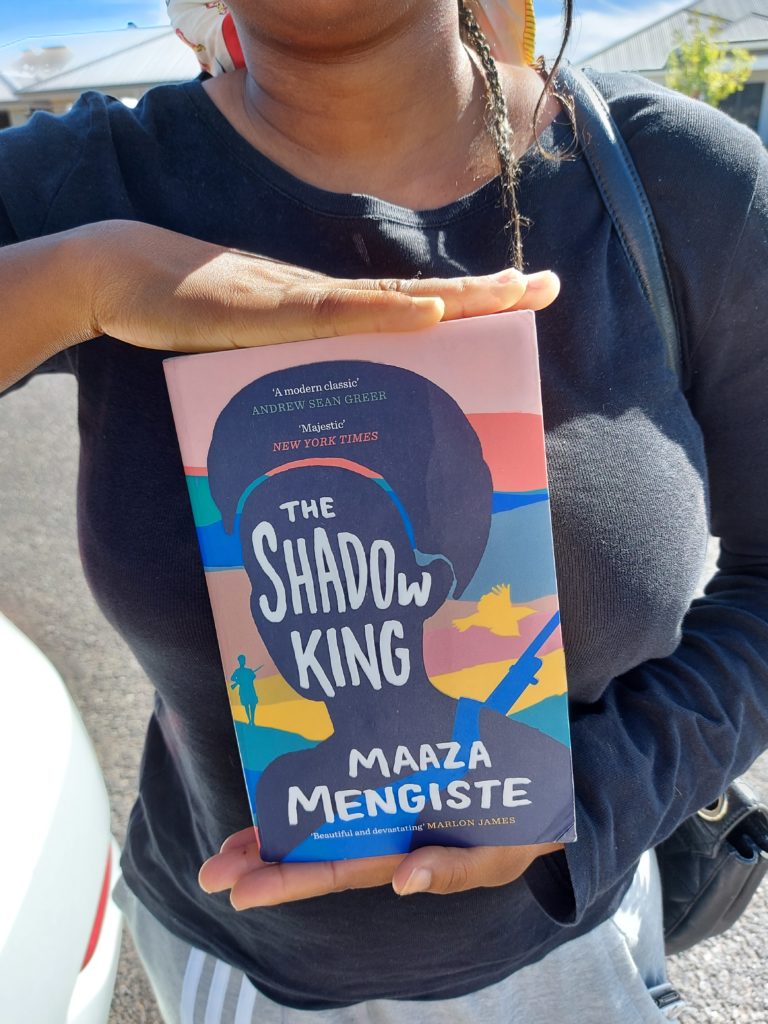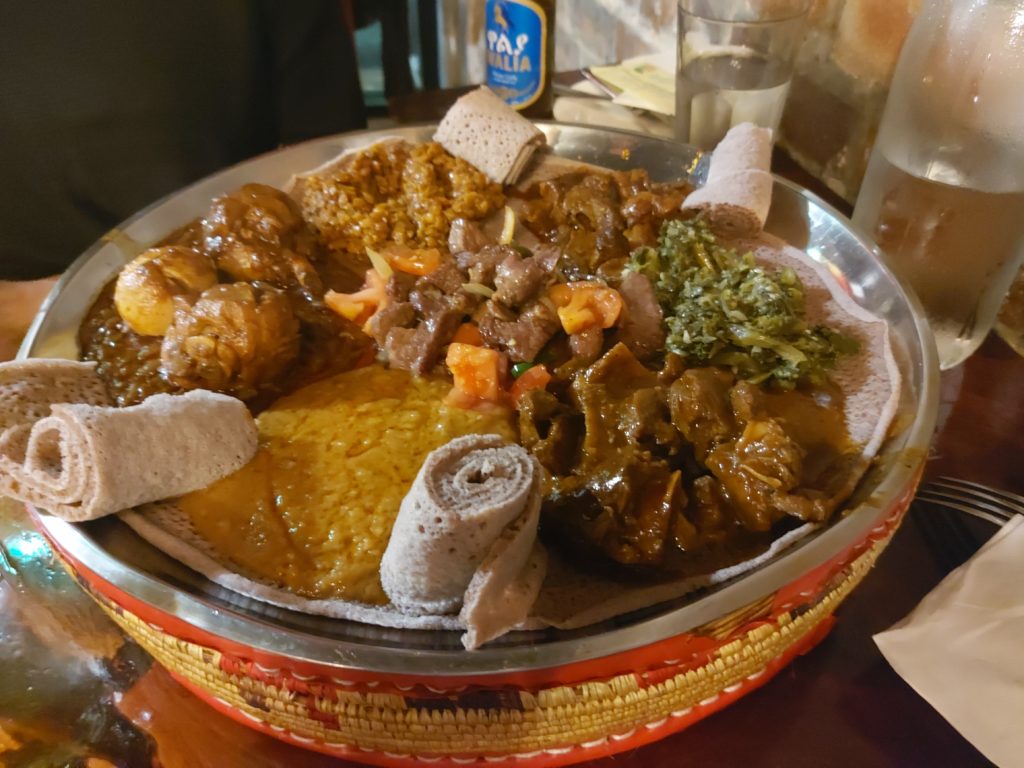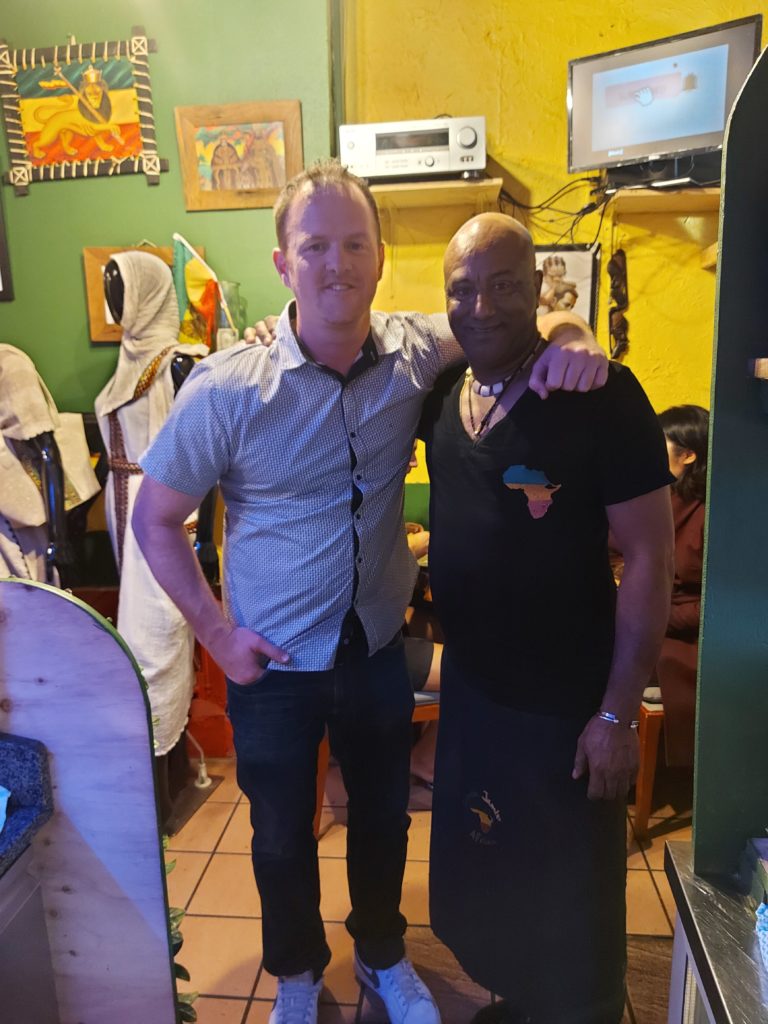watch
Difret, (Zeresenay Mahari) Tizitah Hagere, Meron Getnet. 2014
Admirable chutzpah, a story that needs telling and the film maker’s best intentions, aren’t quite enough to save Difret from its many limitations. The title, translating roughly to courage or daring, can be applied to director and protagonists in equal measure in this at times terrifying tale of the abduction of a 14 year old girl for the purposes of enforced marriage and the resulting, groundbreaking court case. Based on the real life experience of Aberash Bekele, Difret tells the story of young Hirut (Hagere), abducted on her way home from school by a group of farmers and then raped by the man who plans to marry her. When attempting to escape Hirut manages to shoot her chief tormenter in self defence before being recaptured. Her resulting trial for murder with the possible punishment of death forms the backbone of the movie. The film’s premise is shocking: that Hirut could be considered the wrongdoer in this scenario is tough to stomach, her possible execution downright devastating. Women’s rights crusader and gutsy but somewhat green lawyer Meaza, is all that stands between Hirut and a shockingly unjust fate.
Hagere and Getnet in the pivotal roles offer strong performances, all the more admirable considering the clunky dialogue they are often saddled with and the technical limitations of the film makers. Most of the largely amateur cast fare less well. Many of the movie’s shortcomings (ending scenes abruptly in order to avoid difficult to shoot set-pieces for example) are excusable and surely most important is that the message isn’t drowned out by the surrounding chaos. Angelina Jolie produced this work, and whilst the impossibly glamorous starlet is at times the subject of well-earned mockery, she is surely entitled to a pat on the back for bringing stories such as this one to public consciousness. Ultimately Difret has ambitions that exceeds its capabilities but that doesn’t make it altogether unworthy. 2/5
stream@: https://www.youtube.com/watch?v=zsfmeNDVjkU
Lamb, (Yared Zelecky) Rediat Amare, Kidist Siyum. 2015
Azeb has a little lamb which is indeed sure to follow him pretty well everywhere he ventures in this charming, old-world fable. After the death of his mother our plucky hero is left on a farm with unfamiliar extended family as his father ventures to the capital in search of the type of employment he hopes will offer security to him and his young son. Azeb is not your average country boy and is of little use as a farmhand much to the chagrin of his hard knocks uncle, Solomon. Causing further infuriation is Azeb’s attachment to his beloved pet lamb Chuni, a healthy specimen that Solomon would ideally have garnishing family dinner plates long before graduation to mutton. With farming yield at a low ebb and a religious festival approaching, Azeb is seemingly of little use to his new clan. The boy however, is a promising cook with an entrepreneurial streak and perhaps the family’s tight financial restraints are as much a result of stubborn thinking involving gender roles as they are of bad luck. Cooking is of course, seen as strictly the female domain. Azeb finds an unlikely ally in Scion, his female cousin, herself a victim of traditionalism at the hands of her well meaning but strict mother. Scion loves to read and learn about the world at large but is pressured constantly to get married off despite being barely an adult.
Beautifully shot and nicely acted though the film is, it does set up its premise and promptly appear to run out of ideas. The script by director Zelecky offers we outsiders an enlightening view into Ethiopian village life but fails in rewarding its young protagonists with a compelling story arc. As a result the ending feels hurried and tacked on. Zelecky’s debut is endearing and good natured but leaves room for improvement. Hopefully further opportunities will present themselves in uncertain times and within the constraints of a film industry still finding its feet. 3/5.
stream@: https://vimeo.com/ondemand/lamb/
read
The Shadow King, Maaza Mengiste 2019.

A country that has been conflict ravaged since November of last year, Ethiopia finds itself anchored in a state of civil war. What is known of the situation is bleak, the Tigray Region in the country’s north sandwiched between an aggressive neighbour in Eritrea and the rest of a nation run by a government it is deathly at odds with. The death toll is estimated at over 50,000 while many thousands of residents of the region have fled to Sudan. Numerous reports of sexual assault perpetrated by soldiers lend the situation an air of horror it scarcely required. Ethiopia may be in dire straits but it is a nation that is no stranger to conflict. Eritrea itself was of course originally part of Ethiopia but it waged a long and bloody war of independence before finally breaking away in 1991. Hardly the end of hostilities, the two countries waged a fresh war between 1998 and 2000 leading to an estimated 70,000 casualties. This is all to say nothing of Italy’s two invasions of Africa’s second most populous nation in 1895 and 1935 respectively.
Saying plenty about the incidents is exciting author Maaza Mengiste with her sophomore novel, 2019’s The Shadow King. The title refers to a lookalike of Ethiopia’s absentee head of state Haile Selassie impersonating the emperor in order to give hope to his country’s resistance in the face of Fascist Italy’s second invasion. Titles can be somewhat misleading however, and whilst a nice plot device, this conceit is hardly the central one of the story. Mengiste’s dynamic novel centres around the efforts of women in general and young servant Hirut in particular to contribute to the nation’s resistance. Hirut cleans house for feared soldier Kidane and his wife Aster. Hirut, an orphan taken in by her employers, is despised by Aster but is an object of desire for Kidane, whose cruelty eventually justifies his wife’s jealousy. The two women are in no danger of bonding but they act as separate conduits in the women of Ethiopia’s crucial contribution to the war.
Mengiste, whilst understandably making her allegiances clear, nonetheless goes to lengths to populate the Italian army with complex characters. In Ettore, she crafts a protagonist of sorts, a cameraman employed by the army to encapsulate the presumed Italian triumph and thus help oil Mussolini’s propaganda machine. Deeply conflicted, Jewish born Ettore faces an upheaval of his own as the holocaust begins to click into gear back in Europe. Staying in Ethiopia following the end of the war, his path is destined to cross with Hirut’s again years later on the eve of Selassie’s overthrowing as things come full circle.
Mengiste’s epic is hugely but not foolishly ambitious. She casts her net over a slew of key characters, from Emperor Selassie himself to Italy’s feared Colonel Fucelli, the butcher of Benghazi, and gets inside the head of all of them. Meanwhile the story continues to unhurriedly unfold. You do wonder as the book winds down if Mengiste will manage to tie it all together and stick the landing but you needn’t. Her several artistic flourishes such as devoting short chapters to describing Ettore’s photographs or traditional Ethiopian battle cries never quite threaten to derail the narrative. It’s a fine achievement. She has captured the essence of a country fighting for dignity and indeed survival. A country that finds itself in internal peril decades on, perhaps one that would do well to reflect on the struggles of yesteryear.
listen
Mulatu Astatke, 1963-Present
“I never could learn to like jazz.”
“It’s off melody, not what’s expected, behind the notes, improvise, like tonight.”
This exchange midway through Michael Mann’s ominous 2004 thriller Collateral, in which a hitman has taken a cab driver captive as he lines up an evening of murder may go some way to summing up the general frustration of your novice listener attempting to penetrate the genre. It also poses a more immediate question, do you have to be a nihilistic sociopath to fully understand jazz? The answer of course being, no, but it probably helps.
There’s a lot going on with Jazz. A lot that laymen either can’t understand or don’t have the focus and self discipline to properly appreciate. It’s an artform that can beguile and infuriate in equal measure, gently washing over you as it probes the edges of your senses one minute before innocuously building toward a crescendo of chaos that might well have you reaching for the skip button. But you (or I for that matter) not getting it doesn’t mean there’s nothing to get. On the contrary, the constant evolution of jazz throughout the previous century and into this current one leaves a bottomless well of content to unpack and hopefully appreciate as well as countless aficionados who might well try and explain it to you.
Ethio-jazz, with its fusion of latin rhythms and African instruments with more traditional jazz techniques is perhaps more complex than most, but is also surprisingly accessible. As the undisputed father of the movement, Mulatu Astatke is a man who’s earned his stripes. Having turned his back on an engineering Scholarship in Wales as a teenager in the late 1950’s to study music instead, Astatke returned home to Addis Addaba with big plans and a talent to match. In the subsequent decades , having birthed a musical genre and travelled the world performing with countless accomplished bands, he leaves in his wake a treasure trove of recordings to delve into.
Hip hop sample enthusiasts might well have been led into his orbit via Rabbit Hole when blasting that Nas and Damian Marley record. Indie film nerds might have gained an appetite for his sound via the use of it in that quirky Bill Murray flick. But to most western music lovers, Astatke remains an undiscovered gem. Those considering starting out the journey could do worse than whetting their beaks with Ethiopiques, an enchanting selection of tunes from his late 60’s to early 70’s period, before deciding whether or not to dig deeper. Standouts include Yekermo Sew (A Man of Experience and Wisdom) and the sublime Tezeta. From there the options are endless, and as recently as last year Astatke would find himself in Melbourne recording an album with local act the Black Jesus Experience. It’s merely the latest port of call in a long life of globetrotting, collaborating and creating.
For his arrangement, composing and mastering of several instruments, Astatke rightfully takes his place as a giant of the modern era. But how best to enjoy the music, how best to penetrate its surface? Perhaps the best way is to just let it play. Go about your business as the grooves work their way into your subconscious. It might make you happy without you even noticing.
A selection of Astatke’s albums is available on Youtube and Spotify.
eat and drink
Jambo Jambo, 93 Glebe Point Rd, Glebe.




It’s midweek, it’s getting late, it’s cold out. Hell, I’m not even that hungry. Recent habits of over eating are beginning to take their toll. Trying not always successfully to put a bit more money aside for savings. Got an early start at work tomorrow. Feeling pretty exhausted if I’m being totally honest. Have at least been pretty consistent in cutting out alcohol on weekdays. With all this in mind I’ve made the logical decision to drive across town for a platter for two and some beers. I’ve got a blog entry to make after all.
All of the above is true but none of it made Jambo Jambo any less enjoyable. I could have just ordered a curry and some Ethiopian coffee but let’s be realistic. I’m here to talk about Ethiopian food so of course I ordered the injera buffet. There’s the option with three toppings, but then there’s also the option with an additional three toppings for an extra $20, and as regular readers will attest, I’m nothing if not thorough. Additionally it goes without saying that I would try out the Ethiopian beer on the menu. Upon ordering I’m informed that they actually have two types of Ethiopian beer. I guess it’s a good thing they don’t have any Ethiopian liqueurs.
It’s a Wednesday night but Jambo Jambo is full. “We’re always busy,” the owner, Joe, tells me. It’s easy enough to see why. The experience he offers is authentic and unique. The place looks great, walls adorned with Ethiopian art and photography, and it passes the immediate ambience test of playing regionally relevant music as opposed to the type of easy listening standards favoured by the likes of 2day fm. Injera is the national dish, a spongy flatbread that acts as an edible plate. You choose the aforementioned six toppings and dig in. Preferably with your hands. Mix it up with a bit of goat, lamb, and chickpea. You can even throw on some collard greens if you feel inclined.
The beers? Well, I like most beers but I like these beers more than most. Unpretentious but full of flavour, the malty Walia a particular delight. Though I’ve never been convinced of the merits of coffee after dinner I don’t turn one down when it’s offered, because, well because I’m offered one. Full to the point of bursting it’s time to head home. I didn’t want to come out but don’t regret it in the slightest. Hard to say much more than that.
goal of the month
The national team hit Madagascar for four of the best in late March. Gethaneh Kebedeh’s free kick at 1.11 min being the pick of an eye catching bunch.
This is such an interesting post. I particularly enjoyed reading the book review. I have read this book myself, and your review is spot on.
I’d love to visit Jambo Jambo some time: the food looks delicious.